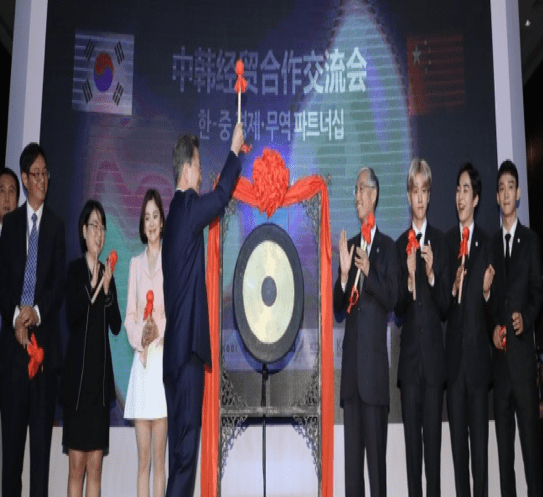In recent years, China, South Korea, and Japan have made a motion to be friendlier towards one another. China and South Korea have made efforts to have relations that are more open. This fostered cultural exchanges between the three countries. However, a couple years ago, tensions between North and South Korea were revived with the installation by the United States of the Terminal High Altitude Area Defense system (THAAD). The threat THAAD presents also cooled relations with China. The THAAD system lead China to restrict access to Hallyu also known as Korean Wave Music.

“Korean Wave” is the flow of South Korean entertainment that started in the early 1990s and created a music genre specific to South Korea. “Kpop” (Korean Pop) was pioneered by artists such as BoA (Korean female singer), H.O.T (early Korean male group), and DBSK also known as TVXQ (another Korean male group). Since 2015, China and Korea have had a steady exchange of culture and relations through entertainment. EXO’s group member, Lay became a youth Ambassador for China while promoting with his Korean music group, EXO.1 His promotions which include album releases, commercials, and movies are done under his individual name in China and through EXO in Korea. The work of Zhang Yixing and EXO serve as a testimony of the impact the flow of cultural icons and they work between the two countries. The Korean Wave includes both art and entertainment. Its popularity fosters cultural exchanges between the citizens of China and South Korea. The success of groups such as EXO, Big Bang, and GOT7 helped to open dialogue.

Although citizen opinion is positive, China had become determined to change this. The implementation of the Terminal High Altitude Area Defense (THAAD) system in South Korea lead China to react negatively. THAAD is a defense system against medium and intermediate range ballistic missiles. Issuing of the THAAD system worries China because it downgrades Chinese security capabilities.2 The reason is quite simple: the THAAD system has a radar build in that enables it to seek out medium and intermediate range missiles in flight and this radar can also have a second function to help discover missile locations on the ground in China which gives the United States a strategic advantage in case of war. This removes China’s ability to keep their missile locations hidden putting them at a major disadvantage. This disadvantage is only amplified by the close proximity of these countries. China and South Korea sandwich North Korea and the Yellow Sea. This proximity is exactly what made the THAAD system necessary, so that it can block missiles that pass over the Yellow Sea or ones North Korea.3 Until then, South Korea and China had some interactions, but North Korean aggression has prompted South Korea to utilize the THAAD system through their American ally.4 The South Korean government in conjunction with the United States began construction in the area surrounding Seongju and completed the work in September of 2017. China has become hostile towards the South Korean government because of many Chinese officials viewing THAAD’s deployment as a sort of betrayal.5 This became evident when the Chinese government did not send high-ranking officials to attend the South Korean Embassy’s National Day reception in 2016. Another example came when the People’s Republic of China suspended high-level talks between the two countries and postponed the visit from the South Korea’s defense minister.6 Asian culture requires a very high level of respect which is usually displayed during important events such as these. However, the actions of China towards South Korea have shown increasing tension between the two.7 This has had a negative impact on diplomatic relations and took a toll on cultural exchanges when China banned Korean entertainment. Korean TV shows that were aired in China were abruptly stopped, faces of Korean actors were blurred out, and Korean names were replaced with Chinese ones during the ending credits. Many Kpop bands had to halt events such as concerts and tours, while Korean film and TV copyright sales decreased in China.8 These were quite drastic censorship measures aimed at erasing all Korean presence in China.

Meanwhile in South Korea, the President, Moon Jae-in had used Kpop’s regional popularity to foster diplomacy. He gifted an autographed EXO album and video message featuring Minho of SHINee to the first daughter of Indonesia during her wedding. This gift helped Indonesian relations with South Korea prosper. This form of diplomacy had also been applied to their Chinese relations. One group with a huge influence in China is EXO. As mentioned before, one member of the popular South Korean boy band, EXO is Chinese and China named him as Youth Ambassador. Zhang Yixing (Lay) is currently promoting in China while proudly representing the Korean group. EXO also consists of a sub unit called EXO-CBX which is comprised of members Chen (JongDae), Baekhyun, and Xiumin (MinSeok). This unit alongside Korean actress Song Hye Kyo (Descendants of the Sun) were used in President Moon Jae-in’s plan involving China.9 The Korea- China Economic and Trade Partnership Forum, President Moon Jae-in deployed the use of Korean idols to warm tensions between the two countries. Sub-unit CBX and Song Hye Kyo made guest appearances during this meeting and used their charm to win the hearts of important Chinese diplomats, thus allowing for a more neutral surrounding while dealing with important trade issues. Since, China and Korea had made steady efforts to increase their future relations in a positive manner. All of that was abruptly stopped by the installation of THAAD!
“We are one!” is the slogan of EXO which perfectly encompasses the model for South Korean-Chinese aspirations. Both countries want to move towards relations that are open and have a policy centered on their common ground. The Hallyu Wave provides this very needed common interest. Although THAAD put a stain on Korea and China relations, the efforts of President Moon Jae-in and the use of media outlets for music and entertainment can foster a comfortable diplomatic setting post-THAAD. With increasingly steady relations between the two, the past may become a “Walk on Memories”.10
In addition to improving Chinese relations, South Korea recently revealed the use of Kpop idols such as Red Velvet, and popular vocalists such as Cho Yong- Pil, Lee Sun- Hee, in addition to rock singer Yoon Do- Hyun and Singer Baek Ji- Young helped warm relations with North Korea.11 Although unification is not currently on the horizon, a joint summit between North and South Korea is scheduled for the 27 of April of this year and a possible meeting of Kim Jong-Un and President Trump in May. South Korean K-pop seems to be a “Transformer” [pun intended!] for positive relations for South Korea. 12
- EXO, The 2nd Album “EXODUS,’ 2015, MY ANSWER ↵
- Swaine “Chinese views on South Korea’s deployment of THAAD,” China Leadership Monitor 52, no. 4 (2017). ↵
- Daniel Gomà , “The Chinese-Korean Border Issue: An Analysis of a Contested Frontier,” Asian Survey 46, no 6 (2006): 867-80. doi:10.1525/as.2006.46.6.867. ↵
- Zhu Feng, “Shifting Tides: China and North Korea,” in The Architecture of Security in the Asia-Pacific, edited by HUISKEN RON, 45-58. ANU Press, 2009. http://www.jstor.org/stable/j.ctt24h898.10. ↵
- Micheal Swaine, “Chinese views on South Korea’s deployment of THAAD,” China Leadership Monitor 52, no. 4 (2017). ↵
- Micheal Swaine, “Chinese views on South Korea’s deployment of THAAD,” China Leadership Monitor 52, no. 4 (2017). ↵
- Jae- Ho Chung, “China’s “Soft” Clash with South Korea: The History War and Beyond,” Asian Survey 49, no. 3 (2009): 468-83. doi:10.1525/as.2009.49.3.468. ↵
- Sonia Kil, “China’s Blockade of Cultural Korea Marks Troublesome Anniversary,” Variety, 24 Aug 2017, Accessed 19 Feb 2018, http://variety.com/2017/film/asia/china-ban-on-korea-culture-anniversary-1202537823/. ↵
- Hong Dam- Young, Song Hye-kyo, EXO-CBX meet President Moon Jae-In in Beijing,” The Korean Herald. 14 Dec 2017, Accessed 30 Jan 2018, http://www.koreaherald.com/view.php?ud=20171214000801. ↵
- EXO, The War – The 4th Album, 2017, Walk on Memories. ↵
- Christine Kim, Heekyong Yang, “North Korea’s Kim Jong Un, Wife, Watch South Korean K-Pop stars perform in Pyongyang,” Reuters, 2 April 2018, Accessed 3 April 2018. ↵
- EXO, The 2nd Album ‘EXODUS,’ 2015, TRANSFORMER. ↵



75 comments
Brittney Carden
I was immediately interested in this article because I’m a huge fan of Kpop and I’ve never really thought of the effect it could have on public policy and affairs. I also know the Kpop group BTS (Bangtan Boys) has spoken at the United Nations in hopes of inspiring change and encouraging the youths to use their voices.
Mariana Mata
I love how this article has displayed a form of diplomacy in a way that would not be overseen in the Western world, but could completely work on the other side of the country. This just shows how much music and openness to culture can be such a critical tool for the good of humanity. As cheesy as it sounds, music has no barrier and it is the most important tool for the good of humanity.
Amanda Gutierrez
As a Kpop fan, I thoroughly enjoyed reading this article. It was very interesting to read about how much of an impact it is making. It truly is amazing. Overall, I loved reading this article. It was very intriguing and well-written. Nice job!
Jose Chaman
I would never have imagined that the Kpop could relate international relations in Asia. However, it is true that music serves as a global instrument for the gathering of thousands of people who differ in age, tastes, among other things. Music will always have an important role in resolving conflicts because it appeals to a more human and relatable side than other types of diplomatic debates. This article does a great demonstration work as China and South Korea have improved their relationships thanks to this musical phenomenon.
Genesis Moro Otero
As K-Pop becomes even more popular these days and as a k-pop fan myself, I find that South Korea using its music and culture in diplomacy was a great way for smoothing out tensions between them and China. It shows how they break the world’s stigma of them just basing themselves on the entertainment industry. Also, how even though they have military tensions they can still try to coexist in peace.
Giselle Garcia
As a fan of K-pop, this article was refreshing to read about K-pop idols being involved in diplomatic relations by positively spreading strong relations with other countries for South Korea. It’s interesting to find out that China had a ban against Korean entertainment, but the use of the music industry has eased tensions between China and South Korea, which proves entertainment is a powerful way to strengthen international relations. I hope people around the world will see K-pop not as just music, but as something that can work for a cause, as seen here in bringing countries together peacefully.
Jacy Hornsby
Reading this article in 2019 as a kpop fan of three years and having visited South Korea in 2018, it is interesting to hear this perspective. As a fan it’s easy to see that there is definite inclusion of foreign singers in various bands, however the blatant colorism and racism that these foreign members face from Korea, their companies, and even some of their band members is evident. Take EXO for an example, since debut they have had Chinese members come and go due to mistreatment by their company, SM Entertainment. Chinese members Kris Wu and Luhan would both go on to file a lawsuit against SM in efforts to terminate their contracts because they felt that their human rights were violated and that they were treated different than the Korean members. Today, this issue is evident. Blackpink, arguably the most successful girl group internationally, alongside Twice, faces their own set of problems. One of the members, Lisa, is from Thailand and she has faced a lot of backlash from the Korean fans recently. There have been reports of Korean fans using Thai slurs and calling her ugly. This stems from a systematic hate for South East Asian countries that South Koreans harbor. There are even allegations that YG Entertainment, Blackpink’s company, pays Lisa less than the other members of the band because she isn’t Korean. While the visibility of foreign members in Korean entertainment has definitely helped start the process of breaking barriers, there is definitely a long way to go.
Kenneth Gilley
What an interesting article! I had no idea that the Korean music industry could improve diplomatic relations between Korea and China they way it has. I am not really a fan of K-Pop, but it sure has made an impact. I can see how the installation of the THAAD system would strain the relationship between China and Korea. It is good to the the music industry bringing them back together.
Mara Martinez
I never knew that the music industry and K-Pop would be what brings China and Korea together in a way. That was really surprising to me, that they can relate on that. The genre of K-Pop isn’t really something that interests me but I have plenty of friends that are interested in it so yes I have listened to some. So it is cool how it really winds up uniting everyone in a sense, as those who enjoy it can discuss it.
Bianca Villarreal
It’s so amazing seeing how K-Pop is more than just a entertainment industry, but actually something that helps with international relations. Or just spreading culture around the world really is amazing. I myself am not a big K-Pop fan other than liking BTS, but I can acknowledge the fact that the genre had definitely blown up and artists are making an impact such as EXO with China or BTS with their UNICEF campaign even.